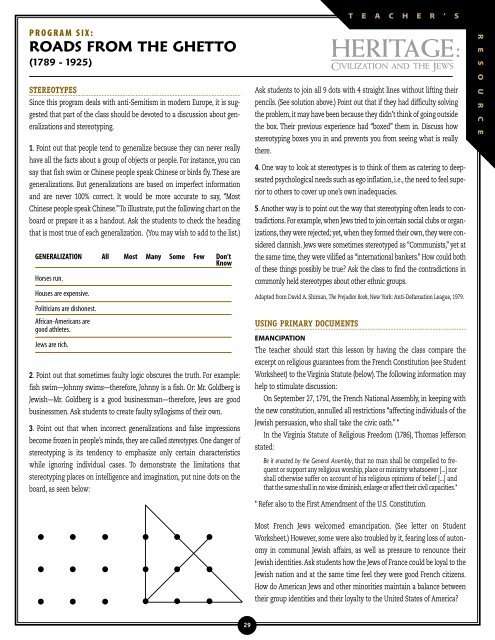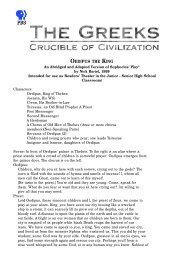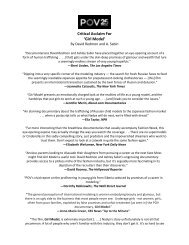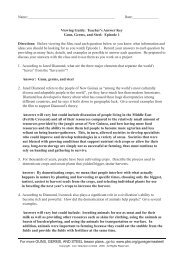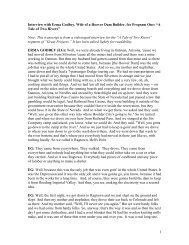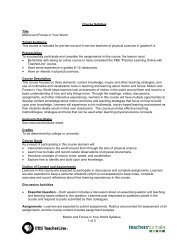HERITAGE: Civilization and the jews - PBS
HERITAGE: Civilization and the jews - PBS
HERITAGE: Civilization and the jews - PBS
Create successful ePaper yourself
Turn your PDF publications into a flip-book with our unique Google optimized e-Paper software.
PROGRAM SIX:<br />
ROADS FROM THE GHETTO<br />
(1789 - 1925)<br />
STEREOTYPES<br />
Since this program deals with anti-Semitism in modern Europe, it is suggested<br />
that part of <strong>the</strong> class should be devoted to a discussion about generalizations<br />
<strong>and</strong> stereotyping.<br />
1. Point out that people tend to generalize because <strong>the</strong>y can never really<br />
have all <strong>the</strong> facts about a group of objects or people. For instance, you can<br />
say that fish swim or Chinese people speak Chinese or birds fly. These are<br />
generalizations. But generalizations are based on imperfect information<br />
<strong>and</strong> are never 100% correct. It would be more accurate to say, “Most<br />
Chinese people speak Chinese.”To illustrate, put <strong>the</strong> following chart on <strong>the</strong><br />
board or prepare it as a h<strong>and</strong>out. Ask <strong>the</strong> students to check <strong>the</strong> heading<br />
that is most true of each generalization. (You may wish to add to <strong>the</strong> list.)<br />
GENERALIZATION All Most Many Some Few Don’t<br />
Know<br />
Horses run.<br />
Houses are expensive.<br />
Politicians are dishonest.<br />
African-Americans are<br />
good athletes.<br />
Jews are rich.<br />
2. Point out that sometimes faulty logic obscures <strong>the</strong> truth. For example:<br />
fish swim—Johnny swims—<strong>the</strong>refore, Johnny is a fish. Or: Mr. Goldberg is<br />
Jewish—Mr. Goldberg is a good businessman—<strong>the</strong>refore, Jews are good<br />
businessmen. Ask students to create faulty syllogisms of <strong>the</strong>ir own.<br />
3. Point out that when incorrect generalizations <strong>and</strong> false impressions<br />
become frozen in people’s minds, <strong>the</strong>y are called stereotypes. One danger of<br />
stereotyping is its tendency to emphasize only certain characteristics<br />
while ignoring individual cases. To demonstrate <strong>the</strong> limitations that<br />
stereotyping places on intelligence <strong>and</strong> imagination, put nine dots on <strong>the</strong><br />
board, as seen below:<br />
Ask students to join all 9 dots with 4 straight lines without lifting <strong>the</strong>ir<br />
pencils. (See solution above.) Point out that if <strong>the</strong>y had difficulty solving<br />
<strong>the</strong> problem, it may have been because <strong>the</strong>y didn’t think of going outside<br />
<strong>the</strong> box. Their previous experience had “boxed” <strong>the</strong>m in. Discuss how<br />
stereotyping boxes you in <strong>and</strong> prevents you from seeing what is really<br />
<strong>the</strong>re.<br />
4. One way to look at stereotypes is to think of <strong>the</strong>m as catering to deepseated<br />
psychological needs such as ego inflation, i.e., <strong>the</strong> need to feel superior<br />
to o<strong>the</strong>rs to cover up one’s own inadequacies.<br />
5. Ano<strong>the</strong>r way is to point out <strong>the</strong> way that stereotyping often leads to contradictions.<br />
For example, when Jews tried to join certain social clubs or organizations,<br />
<strong>the</strong>y were rejected; yet, when <strong>the</strong>y formed <strong>the</strong>ir own, <strong>the</strong>y were considered<br />
clannish. Jews were sometimes stereotyped as “Communists,” yet at<br />
<strong>the</strong> same time, <strong>the</strong>y were vilified as “international bankers.” How could both<br />
of <strong>the</strong>se things possibly be true Ask <strong>the</strong> class to find <strong>the</strong> contradictions in<br />
commonly held stereotypes about o<strong>the</strong>r ethnic groups.<br />
Adapted from David A. Shiman, The Prejudice Book, New York: Anti-Defamation League, 1979.<br />
USING PRIMARY DOCUMENTS<br />
EMANCIPATION<br />
T E A C H E R ’ S<br />
<strong>HERITAGE</strong>:<br />
CIVILIZATION AND THE JEWS<br />
The teacher should start this lesson by having <strong>the</strong> class compare <strong>the</strong><br />
excerpt on religious guarantees from <strong>the</strong> French Constitution (see Student<br />
Worksheet) to <strong>the</strong> Virginia Statute (below). The following information may<br />
help to stimulate discussion:<br />
On September 27, 1791, <strong>the</strong> French National Assembly, in keeping with<br />
<strong>the</strong> new constitution, annulled all restrictions “affecting individuals of <strong>the</strong><br />
Jewish persuasion, who shall take <strong>the</strong> civic oath.” *<br />
In <strong>the</strong> Virginia Statute of Religious Freedom (1786), Thomas Jefferson<br />
stated:<br />
Be it enacted by <strong>the</strong> General Assembly, that no man shall be compelled to frequent<br />
or support any religious worship, place or ministry whatsoever [...] nor<br />
shall o<strong>the</strong>rwise suffer on account of his religious opinions of belief [...] <strong>and</strong><br />
that <strong>the</strong> same shall in no wise diminish, enlarge or affect <strong>the</strong>ir civil capacities.*<br />
* Refer also to <strong>the</strong> First Amendment of <strong>the</strong> U.S. Constitution.<br />
R E S O U R C E<br />
Most French Jews welcomed emancipation. (See letter on Student<br />
Worksheet.) However, some were also troubled by it, fearing loss of autonomy<br />
in communal Jewish affairs, as well as pressure to renounce <strong>the</strong>ir<br />
Jewish identities. Ask students how <strong>the</strong> Jews of France could be loyal to <strong>the</strong><br />
Jewish nation <strong>and</strong> at <strong>the</strong> same time feel <strong>the</strong>y were good French citizens.<br />
How do American Jews <strong>and</strong> o<strong>the</strong>r minorities maintain a balance between<br />
<strong>the</strong>ir group identities <strong>and</strong> <strong>the</strong>ir loyalty to <strong>the</strong> United States of America<br />
29


